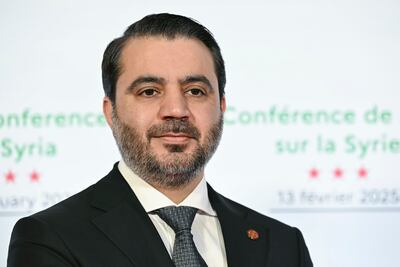Syrian Foreign Minister Asaad Al Shibani on Saturday offered reassurances on the international stage that the new leadership will offer an inclusive future to the country's people while spurning the fate of emerging states that have been drawn into a cycle of conflict with their neighbours.
Speaking at the Munich Security Conference for the first time, Mr Al Shibani said the Hayat Tahrir Al Sham-led revolution against Bashar Al Assad's regime had turned the corner on dictatorship and would put in place a system that reflects the interests of the people that is “Syrian-led and Syria-owned”.
“The example of Syria is different from Iraq and from Libya," Mr Al Shibani said. “The Syrian people got the lesson from these experiences and we also learnt from our mistakes and those of the region. We are keen to to bring the whole Syrian society with us to prevent any actions that will break this stability and our achievement.”

Hakan Fidan, Turkey's Foreign Minister, said he had a first meeting with US Secretary of State Marco Rubio in Munich, at which he raised the issue of American military support for the Kurdish-backed forces in the north-east of the country, who do not support the new state authorities.
He described the Kurdish leadership in the north-east as the biggest threat to Syria, with one third of the land mass and almost all the country's oilfields.
Mr Al Shibani said he wanted Syria to come back to life and called for international sanctions to be removed on the country now that Mr Al Assad has fled. He indicated there had been only limited engagement with the US government since President Trump's inauguration last month but said Damascus was seeking good relations. “We have a lot of things that we can agree on it because the stability and security of Syria is [in the] interest of US and for all the world,” he said.
Geir Pedersen, the UN special envoy for Syria, said the humanitarian crisis in the country would be resolved only if sanctions on the country were lifted.
“We have refugees returning. We have internally displaced [people] returning and they need to see that there is a future in Syria, and they need to see it quickly,” he said. “It will take time before the Americans are capable of addressing the question of sanctions in the broader sense but while we are waiting for that, we need to fix things. Syria needs support, more economic and humanitarian support. And it's crunch time.”
Benedikt Franke, the chief executive of the Munich Security Conference, told The National the summit was a chance for the Syrian authorities to gain new access to a wide range of decision-makers.
“The Foreign Minister [Mr Al Shibani] is here with a relatively large delegation, they've taken part in a lot of meetings, from democratic double standards, to humanitarian aid, to the relationship with the neighbours,” Mr Franke said. “We are certainly going to double down on our relationship with them and aim to include them in as many discussions as we can.”
Iranian influence
Mr Al Assad was a long-time ally of Tehran and its forces helped him to keep Syria's new rulers at bay for more than a decade.
Yemen's internationally recognised government warned in Munich that the Iranian authorities were attempting to replace their lost interest in Syria, Lebanon and elsewhere through their relationship with the Houthis, who run most of the country including the capital Sanaa.
The Houthi militia used its strongholds to deal a huge blow to world shipping last year by defying an international naval coalition to attack vessels in the Red Sea.
“The regime of Bashar Al Assad was hosting the Houthis in Syria and now Iran is looking forward to replacing its power and influence in Syria, and maybe in Iraq, with more influence in Yemen and Africa,” said Rashad Al Alimi, leader of the presidency, which is based in the port of Aden.
Mr Al Alimi said the international community had ignored the situation for too long. “It escalated to this point because the international community was looking away from the suffering of the people of Yemen for 10 years,” he added.
The Houthis' ambitions to control the shipping lanes with the support of Iran remain, despite recently halting attacks. “It is something that the Houthis have been planning for a long time,” he said. “Iran has been investing in the Houthis the entire time in order to take over Bab Al Mandeb and the Red Sea. And when they took over Sanaa in September 2014, they went directly to Hodeidah and took it over as well. This was an Iranian project.”


